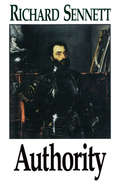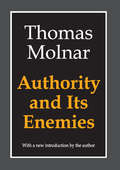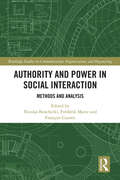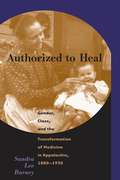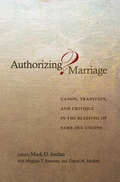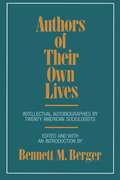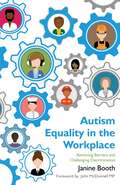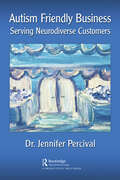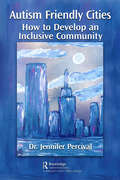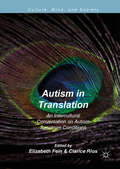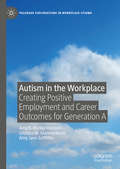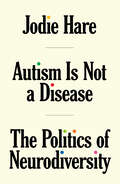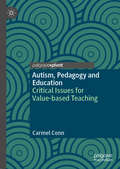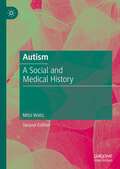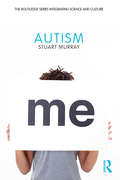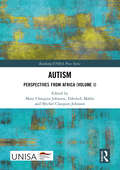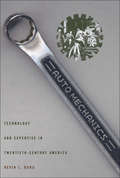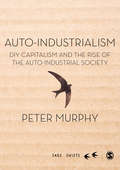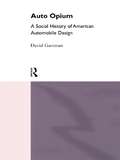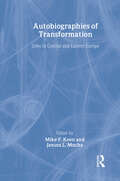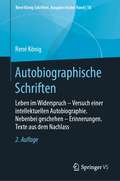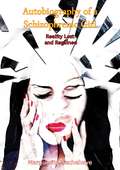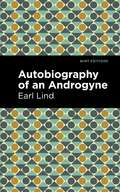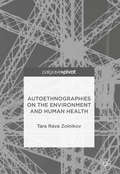- Table View
- List View
Authority
by Richard SennettThis book is a study of both how we experience authority and how we might experience it differently. Sennett explores the bonds that rebellion against authority paradoxically establishes, showing how this paradox has been in the making since the French Revolution and how today it expresses itself in offices, in factories, and in government as well as in the family. Drawing on examples from psychology, sociology, and literature, he eloquently projects how we might reinvigorate the role of authority according to good and rational ideals. A master of the interplay between politics and psychology, Richard Sennett here analyzes the nature, the role, and the faces of authority--authority in personal life, in the public realm, authority as an idea. Why have we become so afraid of authority? What real needs for authority do we have--for guidance, stability, images of strength? What happens when our fear of and our need for authority come into conflict? In exploring these questions, Sennett examines traditional forms of authority (The father's in the family, the lord's in society) and the dominant contemporary styles of authority, and he shows how our needs for, no less than our resistance to, authority have been shaped by history and culture, as well as by psychological disposition.
Authority and Its Enemies
by Thomas MolnarIdeological warfare against authority, especially in the world of higher education, broke out in the 1960s, and continues into the 1990s. No source or symbol of authority escaped untouched neither parents nor teachers nor the cop on the beat. While the hippies have gone underground or disappeared entirely, the assault on legitimate authority continues unabated. As familiar institutions crumble before our eyes, befuddled liberals and conservatives alike throw up their hands in despair. In Authority and Its Enemies, Thomas Molnar asserts that the Western world is reeling from an overdose of freedom without order or authority.
Authority and Power in Social Interaction: Methods and Analysis (Routledge Studies in Communication, Organization, and Organizing)
by François Cooren Nicolas Bencherki Frédérik MatteAuthority and Power in Social Interaction explores methods of analyzing authority and power in the minutiae of interaction. Drawing on the expertise of a diverse international team of organizational communication and language and social interaction scholars, this book suggests reverting the perspective that notions of authority and power constrain human activity, to determine how people (re)create them through conversation and other joint action. Confronting several perspectives within each chapter, the book offers a broad range of approaches to each theme: how and when to bring "context" into the analysis, formal authority, institutions, bodies and materiality, immateriality, and third parties. A core belief of this volume is that authority and power are not looming over human activity; rather, we weave together the constraints that we mutually impose on each other. Observing the details of how this joint process takes place may at once better account for how authority and power emerge and impact our actions, and provide guidelines on how to resist them. This book will be an important reference for students and scholars in language and social interaction, organizational communication, as well as those interested in an alternative take on issues of authority and power. It will also find resonance among those interested in managements studies, public administration and other disciplines interested in situations where authority is a crucial issue.
Authorized to Heal
by Sandra Lee BarneyIn this book, Sandra Barney examines the transformation of medical care in Central Appalachia during the Progressive Era and analyzes the influence of women volunteers in promoting the acceptance of professional medicine in the region. By highlighting the critical role played by nurses, clubwomen, ladies' auxiliaries, and other female constituencies in bringing modern medicine to the mountains, she fills a significant gap in gender and regional history.Barney explores both the differences that divided women in the reform effort and the common ground that connected them to one another and to the male physicians who profited from their voluntary activity. Held together at first by a shared goal of improving the public welfare, the coalition between women volunteers and medical professionals began to fracture when the reform agendas of women's groups challenged physicians' sovereignty over the form of health care delivery. By examining the professionalization of male medical practitioners, the gendered nature of the campaign to promote their authority, and their displacement of community healers, especially female midwives, Barney uncovers some of the tensions that evolved within Appalachian society as the region was fundamentally reshaped during the era of industrial development.
Authorizing Marriage?: Canon, Tradition, and Critique in the Blessing of Same-Sex Unions
by Mark D. JordanThe opponents of legal recognition for same-sex marriage frequently appeal to a "Judeo-Christian" tradition. But does it make any sense to speak of that tradition as a single teaching on marriage? Are there elements in Jewish and Christian traditions that actually authorize religious and civil recognition of same-sex couples? And are contemporary heterosexual marriages well supported by those traditions? As evidenced by the ten provocative essays assembled and edited by Mark D. Jordan, the answers are not as simple as many would believe. The scholars of Judaism and Christianity gathered here explore the issue through a wide range of biblical, historical, liturgical, and theological evidence. From David's love for Jonathan through the singleness of Jesus and Paul to the all-male heaven of John's Apocalypse, the collection addresses pertinent passages in the Hebrew Bible and the New Testament with scholarly precision. It reconsiders whether there are biblical precedents for blessing same-sex unions in Jewish and Christian liturgies. The book concludes by analyzing typical religious arguments against such unions and provides a comprehensive response to claims that the Judeo-Christian tradition prohibits same-sex unions from receiving religious recognition. The essays, most of which are in print here for the first time, are by Saul M. Olyan, Mary Ann Tolbert, Daniel Boyarin, Laurence Paul Hemming, Steven Greenberg, Kathryn Tanner, Susan Frank Parsons, Eugene F. Rogers, Jr., and Mark D. Jordan.
Authors of Their Own Lives: Intellectual Autobiographies by Twenty American Sociologists
by Bennett M. BergerAll students and scholars are curious about the human faces behind the impersonal rhetoric of academic disciplines. Here twenty of America's most prominent sociologists recount the intellectual and biographical events that shaped their careers. Family history, ethnicity, fear, private animosities, extraordinary determination, and sometimes plain good fortune are among the many forces that combine to mold the individual talents presented in Authors of Their Own Lives. With contributions from women and men, young and old, native-born Americans and immigrants, quantitative scholars and qualitative ones, this book provides a fascinating source for students and professional sociologists alike.Some of the autobiographies maintain their reserve, others are profoundly revealing. Their subjects range from childhood, educational, and intellectual influences, to academic careerism and burnout, to the history of American sociology. Authors stands alone as a deeply personal autobiographical account of contemporary sociology.
Autism Equality in the Workplace: Removing Barriers and Challenging Discrimination
by Janine Booth John McdonnellNeurodiversity in the workplace can be a gift. Yet only 15% of adults with an autism spectrum condition (ASC) are in full-time employment. This book examines how the working environment can embrace autistic people in a positive way. The author highlights common challenges in the workplace for people with ASC, such as discrimination and lack of communication or the right kind of support from managers and colleagues, and provides strategies for changing them. Setting out practical, reasonable adjustments such as a quiet room or avoiding disruption to work schedules, this book demonstrates how day to day changes in the workplace can make it more inclusive and productive for all employees. Autism in the Workplace is intended for any person with an interest in changing working culture to ensure equality for autistic people. It is an essential resource for employers, managers, trade unionists, people with ASCs and their workmates and supporters.
Autism Friendly Business: Neurodiverse Customers (Autism Friendly)
by Jennifer PercivalDesigned as a guidebook for leaders at the beginning of their journey embracing neuroinclusion, Autism Friendly Business: Neurodiverse Customers will provide business owners, executives, managers, team members, and associates the tools to integrate strategies and techniques that will enhance their business, while improving the delivery of a quality experience for all. Autistic individuals often experience barriers when engaging with businesses. This book provides solutions and examples on how leaders can remove obstacles to develop supportive and inclusive environments.
Autism Friendly Cities: How to Develop an Inclusive Community
by Jennifer PercivalAccess. Inclusion. Diversity. All people deserve to be embraced by their community. Autism Friendly Cities: How to Create an Inclusive Community is the first book designed to guide city leadership and staff through the process of evaluation, training, implementation, and developing an Autism Friendly initiative that will help you open your doors to everyone. People with autism should be able to participate in all that is offered and facilitated by their city, including services, activities, events, and points of connection. Being an Autism Friendly City is not only socially responsible, but will improve engagement, outreach, economic development, and resident satisfaction.
Autism in Translation: An Intercultural Conversation on Autism Spectrum Conditions (Culture, Mind, and Society)
by Clarice Rios Elizabeth FeinAutism is a complex phenomenon that is both individual and social. Showing both robust similarities and intriguing differences across cultural contexts, the autism spectrum raises innumerable questions about self, subjectivity, and society in a globalized world. Yet it is often misrepresented as a problem of broken bodies and disordered brains. So, in 2015, a group of interdisciplinary scholars gathered in Rio de Janeiro, Brazil for an intellectual experiment: a workshop that joined approaches from psychological anthropology to the South American tradition of Collective Health in order to consider autism within social, historical, and political settings. This book is the product of the ongoing conversation emerging from this event. It contains a series of comparative histories of autism policy in Italy, Brazil, and the United States; focuses on issues of voice, narrative, and representation in autism; and examines how the concept of autism shapes both individual lives and broader social and economic systems. Featuring contributions from:Michael BakanBenilton BezerraPamela BlockM. Ariel Cascio Jurandir Freire CostaBárbara Costa AndradaCassandra EvansElizabeth Fein Clara Feldman Roy Richard GrinkerRossano LimaFrancisco OrtegaDawn Prince-HughesClarice Rios Laura Sterponi Thomas S. WeisnerEnrico Valtellina
Autism in the Workplace: Creating Positive Employment and Career Outcomes for Generation A (Palgrave Explorations in Workplace Stigma)
by Amy E. Hurley-Hanson Cristina M. Giannantonio Amy Jane GriffithsThis book explores the career experiences of Generation A, the half-million individuals with autism spectrum disorder (ASD) who will reach adulthood in the next decade. With Generation A eligible to enter the workforce in unprecedented numbers, research is needed to help individuals, organizations, and educational institutions to work together to create successful work experiences and career outcomes for individuals with ASD. Issues surrounding ASD in the workplace are discussed from individual, organizational, and societal perspectives. This book also examines the stigma of autism and how it may affect the employment and career experiences of individuals with ASD. This timely book provides researchers, practitioners, and employers with empirical data that examines the work and career experiences of individuals with ASD. It offers a framework for organizations committed to hiring individuals with ASD and enhancing their work experiences and career outcomes now and in the future.
Autism is not a Disease: The Politics of Neurodiversity
by Jodie HareHow to build a fairer, more neuro-inclusive societyNeurodiversity is one of the most urgent political issues of our time. As the number of diagnoses of autism, ADHD, and other types of neurodivergence rises, we are starting to understand that there is no such thing as a 'normal' brain. But society is still organised around neuronormativity, and autism is treated as a disease.Jodie Hare, diagnosed with autism at twenty-three, argues it is time to redefine the politics of who we are. She calls for the recognition of diversity as part of natural variation, rather than a departure from sameness. This will have an impact on the places where we learn, work, and socialise - and Hare shows how these can be adapted to be more inclusive and accessible. She shows how we might commit to building a world where we can all thrive, one that works to combat discrimination based on race, class, gender, and disability.
Autism, Pedagogy and Education: Critical Issues for Value-based Teaching
by Carmel ConnThis book discusses critical issues concerning autism and education, and what constitutes effective pedagogy for this group of learners. Autism is a high-profile area within the discipline of special education, and the issue of how to teach autistic learners remains a contested one: recent theorising has questioned a techno-rationalist approach that places the burden of change on the autistic pupil. The author explores the values that underpin educational approaches within existing pedagogical practice: while these approaches have their individual merits and shortcomings, this book introduces and expands upon a strengths-based approach. This book will appeal to students and scholars of autism and education, with particular regard to teaching autistic learners.
Autism: A Social and Medical History
by Mitzi WaltzThis expanded second edition of Mitzi Waltz’s Autism: A Social and Medical History offers an in-depth examination of how the condition was perceived before it became a separate area of investigation, and how autism has been conceptualised and treated since. As well as strengthening the existing text, Waltz has added material on a number of topics that have received increased attention since the first edition, including the rise of the anti-vaccination movement, the shift towards genetic and genomic research, and the progress of the autism self-advocacy movement. The author examines these issues through the perspective of what they mean for autistic people, clinicians and society, and looks at the challenges still faced by autistic people. Waltz also looks at the increased autism diagnosis among girls and women, and how autism has been represented in traditional media and social media. The book includes information from interviews with key researchers, parents of autistic children and people with autism.
Autism: Culture, Narrative, Fascination (Representations: Health, Disability, Culture And Society Ser.)
by Stuart MurrayAutism is the first book on the condition that seeks to combine medical, historical and cultural approaches to an understanding of the condition. Its purpose is to present a rounded portrayal of the ways in which autism is currently represented in the world, It focuses on three broad areas: the facts of scientific research, including new ideas surrounding research into genetics and neuroscience, as well as the details of diagnosis and therapy; the history of the condition as it developed through psychiatric approaches to the rise of parent associations, neurodiversity and autism advocacy; and the fictional and media narratives through which it is increasingly expressed in the contemporary moment. Accessible and written in clear English, Autism is designed for student audiences in English, Disability Studies, Cultural Studies, History, Sociology, and Medicine and Health, as well as medical practitioners and the general reader. Autism is a condition surrounded by misunderstanding and often defined by contestation and argument. The purpose of this book is to bring clarity to the subject of autism across the full range of its manifestations.
Autism: Perspectives from Africa (Volume I) (Routledge/UNISA Press Series)
by Dikeledi Mahlo Mary Clasquin-Johnson Michel Clasquin-JohnsonThis book is written at a time of a paradigm shift in the African continent where dependence on western epistemologies and ontologies are giving way to African indigenous knowledge systems. Africa has been an importer of knowledge from the west since time immemorial and this book contributes to the body of knowledge on autism spectrum disorder (ASD) from the African perspective. As a result, decoloniality and Inclusive Education have gained traction within the academic discourse, with University of South Africa (UNISA) hosting decoloniality annual conference and a summer school to stimulate academic discussions and debates with a focus on African indigenous knowledge systems and theoretical lenses as opposed to the western epistemologies. The book also demystifies some of the misconceptions that children with ASD are a curse and punishment from God or gods. Among others, Ubuntu seems to be the dominant theoretical framework underpinning some of the research studies reported in this book.
Auto Mechanics: Technology and Expertise in Twentieth-Century America (Studies in Industry and Society)
by Kevin L. BorgThe history of automobiles is not just the story of invention, manufacturing, and marketing; it is also a story of repair. Auto Mechanics opens the repair shop to historical study—for the first time—by tracing the emergence of a dirty, difficult, and important profession.Kevin L. Borg's study spans a century of automotive technology—from the horseless carriage of the late nineteenth century to the "check engine" light of the late twentieth. Drawing from a diverse body of source material, Borg explores how the mechanic’s occupation formed and evolved within the context of broad American fault lines of class, race, and gender and how vocational education entwined these tensions around the mechanic’s unique expertise. He further shows how aspects of the consumer rights and environmental movements, as well as the design of automotive electronics, reflected and challenged the social identity and expertise of the mechanic.In the history of the American auto mechanic, Borg finds the origins of a persistent anxiety that even today accompanies the prospect of taking one's car in for repair.
Auto-Industrialism: DIY Capitalism and the Rise of the Auto-Industrial Society (SAGE Swifts)
by Peter MurphyDIY check-outs, drones, self-driving cars, and e-government all are signs of the coming auto-industrial age. Will this end in mass unemployment or will new kinds of work emerge? Will 3D print production, desktop workshops and mass customization make up for lost blue-collar jobs? What will happen to health and education in the auto-industrial age? Will machines replace teachers and doctors? What might the economic and social future dominated by self-employment and a large DIY industry look like? Peter Murphy's lively, provocative book addresses these questions head-on.
Auto-Industrialism: DIY Capitalism and the Rise of the Auto-Industrial Society (SAGE Swifts)
by Peter MurphyDIY check-outs, drones, self-driving cars, and e-government all are signs of the coming auto-industrial age. Will this end in mass unemployment or will new kinds of work emerge? Will 3D print production, desktop workshops and mass customization make up for lost blue-collar jobs? What will happen to health and education in the auto-industrial age? Will machines replace teachers and doctors? What might the economic and social future dominated by self-employment and a large DIY industry look like? Peter Murphy's lively, provocative book addresses these questions head-on.
Auto-Opium: A Social History of American Automobile Design
by David GartmanThis much needed book is the first to provide a comprehensive history of the profession and aesthetics of American automobile design. The author reveals how the appearance of the automobile was shaped by the social conflicts arising from America's mass production system. He connects the social struggles of American society with the organizational struggles of designers to create symbol-laden substitutes for the American dream. Theoretically sophisticated, lucid and compelling, Auto-Opium will appeal to all interested in the American obsession with the car.
Autobiographies of Transformation: Lives in Central and Eastern Europe (Studies in European Sociology)
by Mike F. Keen Janusz L. MuchaAutobiographies of Transformation is a completely unique history of sociology in Central and Eastern Europe in the post-Communist era. Through the autobiographies of ten key sociological witnesses from the region, the sociological imagination is turned upon itself, resulting in a compelling and revealing account of the struggles, triumphs, and continuing challenges faced. The sociologists examined fall into three cohorts: early, mid and late career. As participants, each of the sociologists included has witnessed the intersection of history and biography in Central and Eastern Europe. As sociologists, they have tried, and continue to try, to connect the two so that they and their fellow citizens may better understand their circumstances and the futures that may follow. This revealing book, ideal for students and researchers of sociology, and Central and Eastern Europe studies, provides powerful and compelling autobiographical accounts, relating them to the current interest in this area's transformation.
Autobiographische Schriften: Leben im Widerspruch Versuch einer intellektuellen Autobiographie. Nebenbei geschehen Erinnerungen. Texte aus dem Nachlass (René König Schriften. Ausgabe letzter Hand #18)
by René KönigGeboren im Kaiserreich, aufgewachsenen in der Weimarer Republik, geprägt vom Widerstand gegen den Nationalsozialismus und den Jahren der Emigration in der Schweiz, kehrte René König 1953 nach Deutschland zurück und wurde zu einem der Wiederbegründer der deutschen Soziologie. Die 1980 zuerst veröffentlichte Autobiographie "Leben im Widerspruch" beschreibt die einzelnen Etappen dieses Lebensweges, die Schulzeit in Danzig mit seinem polnischen Hinterland, die Studienjahre in Wien, Berlin und Paris und die vielfältige Tätigkeit als akademischer Lehrer in Europa, Amerika und Asien, die Reisen des jungen Studenten in die Länder des Nahen Ostens, die Begegnung mit der Kultur Siziliens, Erfahrungen als Betreuer eines bundesdeutschen Entwicklungshilfeprojektes in Afghanistan und die Auseinandersetzung mit den indianischen Kulturen im Südwesten der USA. Der zweite, bisher unveröffentlichte Text entstammt einer im Nachlass befindlichen unvollendeten Autobiographie, die mehr persönlich gehalten werden sollte und den Charakter von "Erinnerungen" hat. An ihr hat René König bis ungefähr 1990 gearbeitet. Der Titel "Nebenbei geschehen" stammt von ihm. Behandelt werden in diesen Kapiteln die Lebensabschnitte in Danzig, Berlin und in Zürich.
Autobiography of a Schizophrenic Girl: Reality Lost and Regained (Signet Ser.)
by Marguerite SechehayeMarguerite Sechehaye, a Swiss psychotherapist, followed the work of Sigmund Freud and Jean Piaget closely, believing there was a link between psychosis and trauma experienced as a child. One of her most notable cases was undertaken with a psychotic patient referred to as “Renée”, a pseudonym used for Louisa Düss, whom she and her husband Albert Sechehaye eventually adopted.Over the course of their work together, Dr. Sechehaye took the unique approach of chronicling “Renee’s” journal entries and personal reflections in tandem with her own clinical commentary. The approach significantly influenced mental illness research by introducing an antipsychiatry framework that positioned the patient’s experiences as a valid means of establishing their case histories.As a result of this work, Autobiography of a Schizophrenic Girl: Reality Lost and Regained was first published in 1951, highlighting the most memorable aspects of the disease. The book remarkably reveals to the “normal” mind the emotional shadings, perceptions, confusions, and tortures of a mind at the brink of dissolution. It is at once a harrowing experience and a magnificently moving testimonial to the capacity of a human being to survive and triumph.
Autobiography of an Androgyne
by Earl LindAutobiography of an Androgyne (1918) is an autobiography by Earl Lind. Accompanied by an introduction by Dr. Alfred W. Herzog, Lind’s autobiography―intended for a clinical audience―has been recognized as a pioneering work in the history of transgender literature. Throughout his life, Lind was forced to justify and defend his existence from puritanical authorities who refused to even recognize the reality of his identity as an androgyne. In the first of his trilogy of autobiographical works, he not only demands recognition, but exposes the denial of his existence as nothing but hatred and fear. “Androgynes have of course existed in all ages of history and among all races. In Greek and Latin authors there are many references to them, but these references are not always understood except by the few scholars who are themselves androgynes or at least passive sexual inverts. […] [T]hese men-women, because misunderstood, have been held in great abomination both in the middle ages and in modern times, but the prejudice against them was not so extreme in antiquity, and a cultured citizen having this nature did not then lose caste on this account.” Situating his own identity within this history of oppression, Lind makes the case for recognizing the presence of androgynes in all human societies. Ever since he was a child, Lind identified as feminine and was keenly aware of his homosexual desires, gaining a reputation among the local boys and soon turning to girls for friendship and understanding. In a world that saw androgynes as both corrupt and willfully different, Lind sought to increase understanding and to explain through scientific, historical, and personal evidence why his identity was congenital, and therefore natural. With a beautifully designed cover and professionally typeset manuscript, this edition of Earl Lind’s Autobiography of an Androgyne is a classic work of transgender literature reimagined for modern readers.
Autoethnographies on the Environment and Human Health
by Tara Rava ZolnikovThis book explores the link between individual lives and significant environmental issues affecting millions of people around the world. Zolnikov offers a novel perspective on the environment and human health through autoethnographic stories. Each chapter includes an overview of an environmental risk factor or issue, such as air quality, accompanied by a reflective personal story. Her experiences were gathered around the world and revolve around immersion into local cultures. Learning about environmental health through this qualitative approach will enable readers to understand how issues in the environment are currently affecting people on an individual basis.
